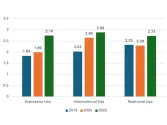
Hong Kong crypto, compliance lawyers may be in high demand in 2025
Legal experts in finance, restructuring, tech and licensing will have an edge.
Chief headhunters in Hong Kong expect increased demand for lawyers who can advise clients on business transactions in regard to the laws of a particular market amidst regulatory intensity including in the areas of risk management, governance, and data.
Legal jobs such as regulatory compliance manager, compliance officer for hedge funds, and legal counsel for funds would be in high demand next year, global recruitment firm Robert Walters Hong Kong said in a report in November.
Lawyers who specialise in cryptocurrencies would be among the most sought after, said Adrian Lam, senior director and person in charge of Hays’ legal recruitment in Hong Kong.
Law firms have been hiring legal experts in the crypto space this year, alongside finance and litigation, restructuring, new technology, and licensing, he pointed out.
The growing need for crypto-specialised lawyers could be tied to Hong Kong’s efforts to position itself as a virtual asset hub, he added.
Reed Smith Richards Butler LLP is also enhancing its regulatory compliance expertise, but more on global sanctions, according to Denise Jong, a partner at the law firm.
Stephenson Harwood LLP is focusing on regulations in Mainland China amidst its growing collaboration with Hong Kong. The firm is linked to Wei Tu law firm in Guangzhou, China.
Wei Tu has been “increasingly busy with work involving the cross-border flow of data and relevant compliance issues, advising clients across transactional, operational, and contentious contexts,” said Evangeline Quek, managing partner at Stephenson Harwood's Greater China offices.
She cited the need for lawyers and law firms to work together internally and externally with peers and clients so they could better deal with the changing global regulatory landscape.
Reed Smith and Stephenson Harwood are also prioritising corporate and capital markets, which Jong expects to turn for the better by the second half of next year. Other growth areas for Stephenson Harwood include private wealth, finance and litigation.
Quek said the firm is also exploring opportunities in the global energy transition, life sciences and healthcare, transportation and trade, technology, and private capital.
Some legal firms in Hong Kong expect aggressive expansion next year, whilst others are cautious about recruitment.
Appleby, known for its offshore expertise, anticipates slower hiring in 2025 for its Hong Kong office after significantly boosting its headcount in dispute resolution, corporate law, funds and banking this year. The firm, however, expects growth in their Shanghai office, which serves both Hong Kong and Mainland China clients, and is eyeing a second Mainland China office.
Attracting, keeping talent
David Bulley, Appleby's managing partner for Hong Kong and Mainland China, said the firm would prioritise senior-level hiring in two key areas in 2025, but declined to give the details.
Over the past 12 to 18 months, Lam cited a decline in legal hiring due to market conditions. “Looking ahead to 2025, it’s neither an overly pessimistic nor an overly optimistic outlook,” he told Hong Kong Business. He added that most law firms and in house legal teams are consolidating, not restructuring to save resources.
To entice more legal professionals and retain talent, both Stephenson Harwood and Appleby are implementing performance-focused pay structures.
“We offer transparent pay structures to allow our people to understand how their performance is linked to their reward, so expectations are clear,” Quek told Hong Kong Business, adding that regular market benchmarking of their pay levels ensures they remain competitive.
Lam said law firms and in house legal teams should structure long-term incentives, such as split-payment bonuses, similar to the practice of some major Chinese companies. Lawyers also prefer flexible work hours because their job is more of a support function, he added.
Bulley said long-term career opportunities especially for high performers could drive high retention rates, whilst Quek said Stephenson Harwood offers legal, skill and on-the-job training, as well as mentorship for their employees.
These should help law firms attract and keep talent in the legal market, which is “very competitive,” Quek said.
Bulley said Hong Kong appears to have become less desirable as a place to live and work for lawyers. “Many candidates for offshore firms in Hong Kong previously came from the UK, Australia and New Zealand, but we now see far fewer candidates wishing to move from these jurisdictions to Hong Kong.”
On the flip side, there has been an increasing number of qualified Hong Kong lawyers who are looking to practice offshore, Bulley said.
Lam cited a “stronger appetite” for lawyers in Singapore and the Middle East though that this does not pose a challenge for Hong Kong in hiring legal professionals. Jong agrees, noting that “there is more supply than demand” for lawyers in the city.



















 Advertise
Advertise







